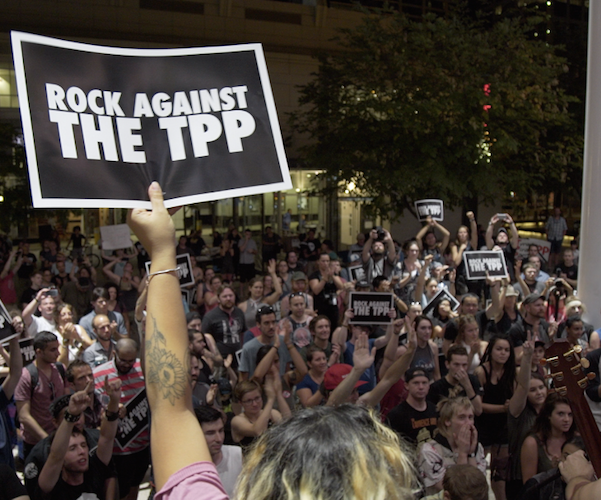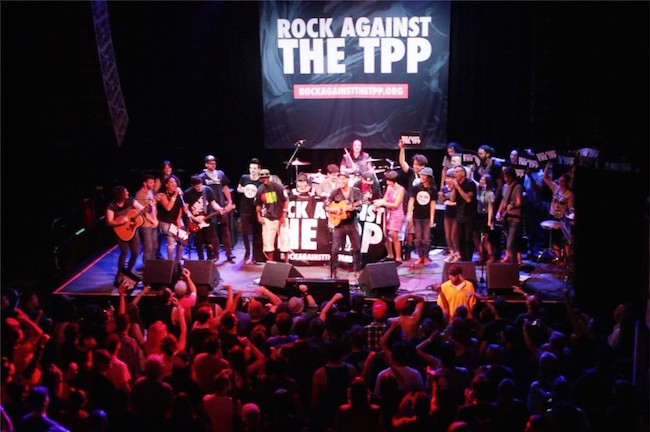Fuse Music Interview: Rock Against the TPP Comes to Boston
“We’re reminding everyone that fighting corruption and injustice is hard work, but it can be fun as hell too.”

A glimpse of the Rock Against the TPP concert in Portland, Oregon on August 20th. Photo: courtesy of Fight for the Future.
By Bill Marx
What kind of political animals are the millennials? There is lots of conjecture, mostly contradictory, among the pundocracy. A few days ago in the New York Times Lionel Shriver asked if the Left can survive the millennials. She doesn’t seem to think it will. In an Atlantic piece, Derek Thompson charges that the millennials will have to do a lot more to bring about the revolution than yell about Big Issues.
Young people treat electoral politics the way they treat Hollywood movies: They only show up for the blockbusters. But the math of democracy is unyielding. If you want a revolution, you have to vote for it. Not just every four years. Not just for cool candidates. Not just for political outsiders unsullied by the soot of experience. If young people want a liberal revolution, they have to vote again and again and again, in local elections, midterm elections, and presidential contests.
“All throat and no vote,” runs on the ‘inside the beltway’ take on millennials. But blockbusters are attractive (and lethal) for a reason, especially when you are talking about the proposed Trans-Pacific Partnership, a maurading Godzilla of an international agreement that would, according to its critics, carve up the global economic landscape according to the whims of the 1%. And you never know. Once young rebels have halted one blockbuster in its tracks — with the assistance of non-corporate types, digital rights groups, labor unions, environmental groups, and small businesses — they may go for more: including deciding to vote regularly for the uncool.
Thus the considerable value of the national tour of Rock Against the TPP, which is coming to Boston on October 7. Organized by digital rights group Fight for the Future, in partnership with legendary guitarist Tom Morello (Prophets of Rage, Rage Against the Machine, Audioslave) and riot-folk singer Ryan Harvey’s record label Firebrand Records, the series of concerts in major U.S. cities is being touted as “the largest mobilization against the TPP in U.S. history.” The line-up for Boston’s free gathering at Spontaneous Celebrations in Jamaica Plain (from 6 p.m. to 10 p.m.) includes indie star Mirah, Ethiopian dance-pop troupe Debo Band, Boston hip hop duo Foundation Movement, afro-latin rock group Taina Asili y La Banda Rebelde, and Firebrand Records artist Bell’s Roar.
I e-mailed a few questions about rock, the TPP, corporate greed, and Fight for the Future’s future plans to Evan Greer, a lead organizer of the nationwide tour who is based in Jamaica Plain. (She put most of the tour together in her living room and co-working space in the South End.)

Tom Morello in the finale of a Rock Against the TPP concert. Photo: courtesy of Fight for the Future.
Arts Fuse: Why did you decide to undertake this challenging project — a nationwide tour against TPP? And why now?
Evan Greer: There are so many important causes and issues facing our world, sometimes it’s hard to decide what to work on. But the Trans-Pacific Partnership poses a serious threat to almost everything we all care about: good jobs and decent wages, our environment, the safety of the food we feed our kids, our internet freedom, even access to affordable medicines we rely on.
The TPP is not about trade. It’s about corruption. But due to the extreme secrecy surrounding the negotiations of the TPP, way too many people still don’t know what it is. The goal if this tour is to harness the power of music and culture to change that, and quickly educate large numbers of people about this corrupt deal.
AF: How did you arrive at this particular mix of performers in Boston? Did some groups not want to participate?
Greer: Performers from many different genres have been coming out of the woodwork to raise their voices against the TPP. We’ve had so many great acts on the tour and it’s exciting to see a lot of performers that would normally never share a stage together on the same bill because they’re standing together for such an important cause. Since it’s a nationwide tour spanning several months and covering a lot of ground, the lineup of performers varies from city to city based on artists’ schedules. The lineup we have in Boston is really unique and folks who come will have a chance to dance, rock out, listen, and learn, all in the same night.
AF: Talk a bit about the digital rights group Fight for the Future. What is its goal, beyond the tour?
Greer: Fight for the Future is a grassroots non-profit that originated in Massachusetts and works to protect the Internet as an open platform for freedom of expression and social change. That’s a fancy way of saying we fight tooth and nail to keep governments and corporations from messing up the awesome Internet that we all love and depend on. We work to defend online privacy, oppose censorship, and protect our most basic rights in the digital age. We’re probably best known for organizing some of the largest online protests in history including the SOPA Blackout, the Internet Slowdown for Net Neutrality, and Reset the Net to oppose NSA spying.
We oppose the TPP because it contains a number of provisions that could seriously restrict the way that we use the Internet to share information and learn about the world around us. The future of the Internet should never be decided in secret, closed-door meetings between corporate lobbyists and government bureaucrats.
AF: What are your thoughts about how the millennials see TPP — is it an important concern? If not, why not?
Greer: I’m not sure millennials are as monolithic of a group as everyone seems to think they are, but I can tell you that the Rock Against the TPP concerts have attracted amazingly diverse audiences that include people of all ages. I’ve seen teenage punks with spiky hair dancing next to grandmas and Steelworkers and nurses and small business owners.
AF: There used to be a strong connection between rock and politics. But that seems to have weakened. Do you agree? Does this tour signify some sort of change?
Greer: I actually think there is a lot more political music in the world now than there was in the 60s–which is the era that everyone always points to when they think about “protest music”–it’s just not getting mainstream radio play. But the Internet is providing a platform for so many artists who are raising their voices about important issues through their songs, music videos, and social media accounts. And it’s spreading across genres. It’s not just rock and rollers and folksingers — so many of the important songs about our world being written today are coming out of the hip hop scene, queer music communities, latino punk rock collectives, and more. Tom Morello, who helped us get this tour on the road, is filling huge venues right now on the Prophets of Rage tour. Political music is as big as it ever was, but you have to know where to look.
AF: Isn’t this tour essentially about preaching to the converted? In what way is this gathering reaching out to those who aren’t aware of TPP?
Greer: When this tour started, polls showed that more than half of people in the U.S. did not know what the TPP is. That’s changing, but the reality is that your average music fan doesn’t know a lot about this agreement. Even if they’ve heard the name, and even if they do know a little about what the TPP is, most people still couldn’t articulate how it will affect them, or how they can get involved in the movement to stop it. This tour is giving people tools to not just be aware of the TPP, but to do something about it. Working with well known musicians, actors, and comedians helps us reach large audiences of new people who we haven’t been able to reach with more traditional forms of activism like marches, protests, and petitions.
AF: Ideally, what you like to see come out of this effort? There are plenty of musicians, rock and otherwise, who are only to willing to accept corporate dollars. WGBH’s marketing motto for its arts programming is that it helps us “escape politics.”
Greer: Our goal is simple: we’re using the power of music to educate large numbers of people about the serious threat to our rights posed by the Trans-Pacific Partnership, and we’re helping ignite a movement to stop it ahead of an expected vote in Congress during the “lame duck” session after the election this Fall. In the process, we’re reminding everyone that fighting corruption and injustice is hard work, but it can be fun as hell too.
Bill Marx is the editor-in-chief of The Arts Fuse. For over three decades, he has written about arts and culture for print, broadcast, and online. He has regularly reviewed theater for National Public Radio Station WBUR and The Boston Globe. He created and edited WBUR Online Arts, a cultural webzine that in 2004 won an Online Journalism Award for Specialty Journalism. In 2007 he created The Arts Fuse, an online magazine dedicated to covering arts and culture in Boston and throughout New England.
